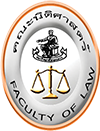The Bachelor of Laws program was launched in 2002 (B.E.2545). It was founded as part of the Faculty of Humanities and Social Sciences, Naresuan University.
In 2003 (B.E.2546), Naresuan University adopted an institutional reorganization plan to decentralize executive power and develop specialized knowledge areas. As a result, the Faculty of Law was established upon the approval of the Naresuan University Council in the University Council Meeting No. 107 (3/2546) on 31 May 2003 (B.E.2546), which came into force on 1 October 2003 (B.E.2546).
The main purpose of establishing the Faculty of Law is to increase the opportunity for the locals to access legal education. Situated in the lower northern region of Thailand, the Faculty’s location allows students to participate in in-person classes, engage in stimulating and thought-provoking discussions, and acquire problem-solving skills, especially for the local communities’ problems. The Faculty, furthermore, has an aspiration to produce a lawyer who upholds moral and ethical values and becomes an exemplary role model and a reliable lawyer for societies.
In a long term, Naresuan University aims to be an educational center of nine provinces in Lower Northern Thailand, which have high biodiversity and local wisdom from generations to generations. Besides, this region is prepared for the development of the ‘Economy of Wisdom and Learning’ – a new economic system which requires law as a mechanism to access the essential and foundational resources to create innovative wisdom and protect all rights and benefits derived from such creation.
The establishment of the Faculty of Law is a response to Naresuan University’s developmental strategy, which aims to be a legal learning center in the Lower Northern Thailand to deliver knowledge for the protection of a community’s rights. Apart from being a legal learning center for students, the Faculty’s mission is to become an academic resource for connecting international knowledge with local development. To complete the mission, the Faculty joins the nine provinces of the Lower Northern of Thailand to participate in the local problem resolution process by integrating the expertise of staffs, including teaching staff, support staff, and students, together with the cooperation from the public, local government agencies, civil societies, and private sectors.
Therefore, the establishment of the Faculty of Law does not only provide educational opportunities for the people in the region but also strengthens a strong community, systematically resolves the issues, and delivers academic services in harmony with the local community’s needs which leads to the country’s development.
![]()
